March Recap: Well, I missed writing about some stuff!
One of the great things about a blog is that I'm not beholden to deadlines. I can tell the boss I don't feel like writing anything and he doesn' t care; in fact, he often agrees with me and even enables my slacking. The downside is that I actually get to missing the act of writing, applying my meager critical skills, and sharing this with whomever.
March flew by and I thought I'd actually written more than I had. I have a spreadsheet I use of movies seen and a column marked "for RS?" that receives a "Y" if I feel like I should write up a movie. The "Y" is in red font, to remind me to follow through and once published, I switch the font to black. That way, I have a record of what I've written.
What's wacky about this is that while I have a spate of films I saw in March, and the "Y"s are all in red, there is a bunch of films in February that have black "Y"s by their titles that I haven't written up and some of them are pretty big omissions. It looks like April may be my make-up month.
What about March, though? Let's start with Dune Part 2. It's a massive accomplishment for Denis Villeneuve and I enjoyed it enough to see it twice, and it would be churlish to say it's not a wonderful work as far as it goes, but while absorbing and beautifully executed, I came away with a sense that it was too well executed, too polished. Everything was just so. The performances were likewise excellent in the way a piece of jewelry might be described as exquisite, but it's not going to change a life.
Am I asking too much from the film? I don't think so. Villeneuve has brought us a filmography replete with challenging ideas, very often emotionally challenging, as well. In almost every one of his works, there is an urgency and a sense of necessity that this film had to be made (including Blade Runner 2049}. With Dune Part 1 and Dune Part 2, there is a kind of lapidary preciousness.
Yes, there's action, some wit, an ambiguous "hero" in Chalamet's Paul Atreides, and the requisite thematic richness we've come to expect from Villeneuve. However, it all seemed so "constructed". I came away thinking of something that Pauline Kael said about Goodfellas when it came out (this was one of her recurring criticisms of Scorsese); you could see the directing - the camera technique, the cinematic flourishes that - for Kael and emphatically, not for me - did much of the work and created a remove from the film.
I don't feel quite that about the Dunes. But I feel that some of that applies here; there is a studied, mannered approach to the material that is so ... earnest. The lack of irony or some kind of sustained wit to counterbalance The Enormity of It All is what kept me from fully engaging with the work at hand. This is an issue that sometimes hampers directors more than one would like to admit. Christopher Nolan sometimes falls into this trap, but usually extricates himself at some point in the narrative. Villeneuve here does not.
This wouldn't be a knock if there was a greater sense of tension or genuine suspense; but the story beats come so regularly that while visually gorgeous, nothing in either film surprised me. I've read the first eighty or so pages of Dune, but I think even if I'd read the entire book, I would still want to some sense of stakes and despite the stakes here being planetary, much of it felt weightless.
Greg Fraser brings remarkable compositions and set-ups to bear at the service of a truly epic narrative and he's never less than excellent (see also Zero Dark Thirty, Lion, Rogue One, for starters, as well as Dune, for which he took home an Oscar); Hans Zimmer's score is another sonic masterpiece, and there isn't a sub-par performance among the cast, but again, the proceedings felt so programmatic.
That last bit said, while everyone brought their usual excellence to the table, the characters themselves don't quite come across as organic. It's in the writing; not that the dialog is stilted or bad, it's just that the relationships are flat. Yes, Paul and Chani are in love; yes, we're happy when we see Josh Brolin's Gurney show up; yes, Austin Butler's Feyd-Rautha is a psychopath, and so on; but everyone fits so nicely into their respective niches that even given long takes and time for actors to flex their considerable chops, the relations are airless, cramped - ironically, in a film so visually spacious - and as rigid as the architecture in its quasi-Brutalist structures.
The most exciting aspect of all this is how we see Paul corrupted by his own messiah complex and the wedge it drives between him and Chani. Zendaya and Javier Bardem are somehow able to bring more dimensionality to their roles but even Zendaya's Chani seems to be more of a chess piece than a person. Bardem plays Stilgar with the kind of lightness the film could have used more of. I don't mean laugh out loud comic bits; just some sign that there's room for some kind of play. Actually, Dave Bautista's Rabban comes close in a different way. He's a bully and eventually outed as a coward; his cousin Feyd-Rautha gets him to submit and kiss his boot and for a moment, it feels like two characters are actually going to develop into more than gears.
Is suspect Dune 2 will be recognized next spring. The AMPAS love an epic. I do, too, but I just prefer mine with more signs of life.
UPDATE: February 28, 2025. Called it! #2025Oscars.
Grrl Power with a Vengeance: Love Lies Bleeding, But I'm a Cheerleader, Drive-Away Dolls
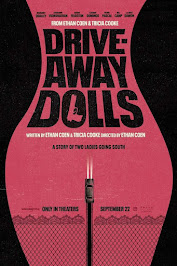

Of the three, But I'm a Cheerleader is the least fraught with danger of the fatal type. A cult masterpiece from 1999 that takes sure aim against gay panic (skewers the shit out of "gay conversion therapy" and underscores just how much more preoccupied with other people's sex lives conservatives often are and how much they think they can force kids back in the closet), Jamie Babbit proves herself to be the daughter John Waters would be proud to have. Her tone is gentler, but her eye for pop confectionary and ear (with Brian Peterson) for spot-on dialog provide the cement that binds the characters and story together.
Natasha Lyonne is Megan the cheerleader of the title sent to a "gay rehab" called True Directions where she meets Clea Duvall's Graham, a post-punk lesbian teen whose parents - like all the other kids' - are clueless, if not outright hostile to their children's orientation. Thankfully, Babbit and Peterson avoid the cliche of the parents coming around to accepting their children; nope, these moms and pops are committed homophobes Megan's parents (Bud Cort as Peter and Mink Stole as Nancy - there's your Waters connection up front!)
Under the not-so-watchful eye of Mary (Cathy Moriarty) and Mike (RuPaul - yes, you read that right), who run True Directions, Megan and Graham meet-not-so-cute-but-kinda and fall for each other. Complications ensue when both sets of parents deliver ultimatums of expulsion from the family unit if they don't, um, go straight. Needless to say, they don't and eventually find support and safe haven at an alternative center run by two former inmates of True Directions played by Wesley Mann and Richard Moll as two super-communicative guys.
Writing about a comedy is like trying to analyze a joke. You start off by killing the thing you want to share, so I'll just say that But I'm a Cheerleader kept me laughing out loud and when I wasn't laughing, I giggled my ass off.
By contrast, Drive Away Dolls from Ethan Coen and his beloved editor...and wife, Tricia Cooke is a hoot of maniacal proportions. The first time out, I liked it a lot; the second time, I loved it. I don't know if this makes sense to declare as axiomatic, but I think Joel Coen might have been responsible for the more classical and dramatic elements in the Coen brothers' oeuvre and Ethan for the more surrealist-absurdist flourishes.
Drive-Away Dolls is road trip centered on a drive away where Margaret Qualley's wild child Jamie decides to join the straitlaced Marian (Geraldine Viswanathan) on her way to Tallahassee for. much-needed change of life for Marian, anyway; Jamie is just about fine and horny wherever she is, but no doubt sticking around Boston may not be the thing for her after a break-up with her volatile cop girlfriend Sukie (a hilarious Beanie Feldman...geez, she's swell).
The noir element/thorn in the ointment is a suitcase of phallic contraband belonging to a Florida senator (Matt Damon, again proving himself to be game for absolutely anything and everything), dildos, if you will. But these aren't your garden variety Adam and Eves or Doc Martins; nope, these four substantial tools were cast from the good senator and his cohort's aroused members by Tiffany Plastercaster (Miley Cyrus!) back in the late sixties when the senator was experimenting and long before he knew he would be serving his country.
Through a classical case of mistaken identities, Marian and Jamie pick up a car in the trunk of which is stored the big boy parts and, oh, the head of the dildo collector that was separated from his body when he attempted off-load them to the wrong people. Two of those wrong people are a couple of goons - one very much dense and angry and violent (C.J. Wilson) and the other always willing to talk things over to get information necessary to obtain the object of their quest (Joey Slotnik, in a role that would likely have gone to J.K. Simmons in earlier days). They answer to Coleman Domingo who is in the employ of Senator Gary Channel, a long-suffering commander who would likely prefer to ride around reading Henry James, an author he shares with Marian.
All of this is the merest set-up for a very funny, and in places violent, film. And sexy. Very sexy. The chemistry between the leads is palpable and Qualley and Viswanathan sell the nuances of their friendship turned something deeper beautifully.
Were I pressed to compare this with works Ethan and his brother have done, it smacks of Raising Arizona, The Big Lebowski, and Burn After Reading. In other words, it's a hoot.
There are too many moments that had me howling and I really wish I could write out what they were, but then it might wind up being the lion's share of the script. I think the film might be an acquired taste. For me, it wasn't a matter of content, but it has a distinct rhythm that I wasn't sold on the first time around; the ending seemed abrupt and some editorial decisions didn't make sense until later in the movie and they threw me off over much of the film. Once I knew the what and the why, though, all was well.
Love Lies Bleeding is a darker, neo-noir set in the 80s (come to think of it, so was Drive-Away Dolls) and of the three might be the most surprising, going places that - trust me - you wouldn't suspect. Rose Glass follows up Saint Maud with a spectacular second feature that has resonances with Red Rock West, Thelma and Louise, and Nacho Vigalondo's Colossal. The less I say about that, the better off everyone is; I'm trying to be a little more spoiler-free in this outing.
Kristen Stewart plays Lou who works at a gym owned by her dad who likewise owns the town's gun range, and very likely, more of the town that the average citizen knows. He also seems to run guns and is on the FBI's radar. Lou is stuck in park in this unnamed nowhere until Jackie comes into town, an amazon en route to Las Vegas for a female bodybuilding competition. Katy O'Brian is a find here; I remembered her from Ant-Man and the Wasp: Quantumania and The Mandalorian, of course, but she's been on the scene for awhile, with turns in Z Nation and The Walking Dead. Here, she's a force of nature, sweet and tough but soon to be roided out, and raging with hormones and anger.
Ed Harris is on hand as Lou's father and it's one of his creepier roles. Sporting a bald cap with long stringy hair, he could be auditioning for the crypt-keeper role for Tales from the Crypt. He and Stewart are always gripping to watch. Is there anyone as still as Kristen Stewart? There's a whip-smart intellect behind those eyes but she foregrounds nothing - we encounter a character with a past she doesn't want to talk about and she is, in some ways as intimidating as her dad.
As for Jackie, things heat up rapidly between her and Lou. At the film's beginning, she's been shtupped by Dave Franco as a sleazeball whom will run into later and who pays dearly for being an abusive spouse to wife Beth (Jena Malone), Lou's sister. Does it sound like a small town with lots of secrets? Oh, you better believe it.
Again, I don't want to give too much away, but there are crosses to bear and double-crosses - intentional and otherwise - that amplify the noirishness to a fever pitch. I really can't say more without blowing a reveal of huge proportions but the film takes a detour into magical realism/sci-fi that actually works really, really well.
 |
Late Night with the Devil is not just an inventive exercise in found footage; it's a tour de force of acting from David Dastmalchian and an acerbic look at showbiz ambition through a hyper a Faustian lens. The conceit is that we're watching an artifact from the late 1970s, the final show of Jack Delroy's talk show Night Owls with Jack Delroy and whose career has been overshadowed by Johnny Carson but he has a chance on this Halloween night to make a killing in the ratings.
Even if the directors, Cameron and Colin Cairnes, had elected to just show the episode, it would be a compelling (if maybe confusing) film, but the cameras run behind the scenes capturing Delroy's producer attempts to keep things rolling on an even keel, and as things get weirder up front, that keel is subject to increasingly disturbing seas.
Partly as prelude, Michael Ironside's voiceover gives us David's back-story; local on-air talent migrates to the majors, meets with some success but things bottom out and his wife gets cancer which he exploits by having her on his show. After. her death, he takes time off, returns to late night, but never achieves the success he'd garnered.
We also learn that David would regularly take off to "The Grove" a private gathering of rich and famous men (modeled on The Bohemian Grove, maybe?) which proves critical to what happens over the course of evening.
What an eveing; Jack has put together a Criswell type psychic - but more sincere and maybe genuinely gifted, a skeptic and active debunker of occult charlatans, and a psychic researcher and her patient, a young girl who both claim to be able to summon a demon. If I told you what happens completely, the set-up and performances are so strong that I don't think it would matter. That said, I'm not going to spill too many beans.
One bean I will spill is that the psychic Christou (played by a truly fab Fayssal Bazzi) does a couple of cold readings; one that fizzles and the other that lands. Former magician turned debunker Carmichael the Conjurer (Ian Bliss who I almost mistook for John Malkovich) challenges Christou's reading and deconstructs it for the audience. At one point, though, Christou has a seizure and vomits up some black fluid, which Carmichael summarily dismisses an mere theatrics. An ambulance is called and we learn backstage that Christou died en route to the hospital.
I mention this because this is the first in a series of events that increases the tension and apprehension on set and on screen and a) pulls you in more because the characters are so well-drawn and b) you really want to get to the bottom of this. Through it all, we see Jack maintaining his cool as much as possible until he can't, but it's difficult to read if he's using his increasing emotionality performatively or if he really is barely holding it together.
And yes, the usual possession batshittery appears here but it's so organic and authentically shot that I didn't question it. Plus, Rhys Auteri as Gus, Jack's sidekick, is a study in severely shaken nerves. He's a genuinely good guy who we know goes to church, and believes that the aforementioned batshittery is what he should get away from ASAP.
And yes, the young girl Lilly (Ingrid Torelli) is as genuinely possessed as Regan from The Exorcist, only she's on TV! What could go wrong?
Lilly is the survivor of a mass ritual suicide by a satanic cult led by an Anton LaVeyish wannabe who falls under the care of Dr. June Ross-Mitchell who likely has more of a connection with Jack than he'd like broadcast. About that...nyah, go see the flick.
Laura Gordon is spot-on as the good doctor who has misgivings about doing the show, the exploitation of Lily, the possibility of things going sideways, and despite being a prime opportunity to promote her book, the actual damage to her credibility this could potentially bring.
Through it all, the film is anchored in its switches between verité behind the scenes footage and cuts back to the actual show. What anchors the anchor, though, is Dastmalchian's performance. It's not showy, but it's as show business-y as the character requires. The decency underneath of an ambitious man who just wants his part of the pie is present throughout - he's misguided, and he's fucked up (and severely fucked) - is handled by the actor with a sense of assurance you only see in the best.
The most recent role I saw him in was as Polka-Dot Man in James Gunn's The Suicide Squad (rent it/watch it now). You've seen him in The Dark Knight, the Ant-Man franchise, Blade Runner 2049, and in Villeneuve's Dune. Oh, and he's in Oppenheimer. He's been on stage for at least twenty-five years, so what I'm saying is that he's got the bona fides to pull off a starring role like this with immense skill.
If there's a flaw, I don't see how one particularly sequence could have been reasonably executed otherwise. It didn't take me out of the film, but after the fact, made me wonder about how it would be accounted for reasonably, since it's one of those nagging quibbles people might justifiably have. It doesn't detract from the film's excellence, and it makes narrative sense when you see the film to a good degree. Go see the film, you'll know what I'm talking about.
In any other year, Perfect Days might have taken the gold statue for Best International Feature. Wim Wenders directed and co-wrote with Takuma Takasaki one of the most gentle, revelatory studies of a singular character I've ever seen. It resonates with his earlier work like Anna in the Cities in its tone of wistfulness and even wonder, but there's magic in Koji Yakusho's performance as Hirayama that I reminds me of nothing else I've seen.
Hirayama cleans public toilets in Tokyo, is mostly silent throughout the film; but when he speaks, it counts. I don't mean that even in some portentous way; just that what he has to say comes both as a surprise because he's so laconic, but also because they're just the right words.
There is no plot to speak of, but every person in the film - no matter how small the role - seems to. be worth taking a sympathetic look at because that's pretty much what Hirayama does. There's this extremely rich interiority that Yakusho brings to the role and a couple of people show up in his life that tell us more about him than an exposition ever would because we see it in how he acts, how the others who know him speak to him, and how he moves on through his life.
I cheated: I saw Perfect Days back in February. Also, any film that has Lou Reed's A Perfect Day on the soundtrack is automatically going to be a great film. The soundtrack, by the way, is bitchin'.
Chinatown got a rerelease at Regal, nicely restored and still a perfect movie. It is a prime example of why we need to separate the art from the artist.
Speaking of older films, I got to see G. W. Pabst's Pandora's Box on the big screen finally. I agree with Roger Ebert that Louise Brooks makes the film; it's a great work because she does something in that film that none of her contemporaries were doing. Her Lulu is thoroughly self-absorbed and brings ruin to others without meaning to; but it's how naturalistic Brooks is in the role. If you met Lulu in real life, you would - I hope - run. I've met my share and didn't always have the good sense to head the other way (no regrets!) but none were as luminous as Brooks. She doesn't just convey a range of emotions, she gives them to the audience.
Both Pandora's Box and Chinatown deserve more from me, but perhaps another time. I have some ideas for April that I hope I get to share and folks enjoy. No spoilers, though!

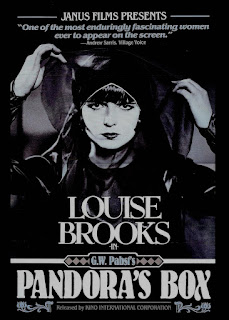
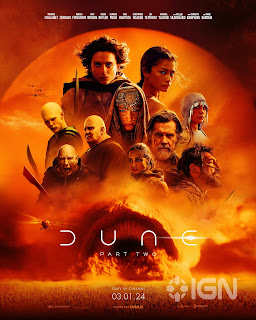
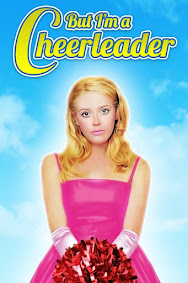
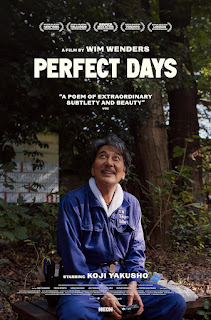
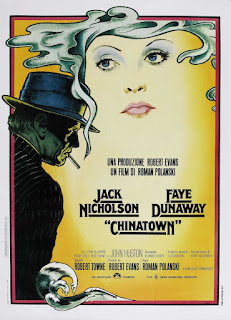




Comments
Post a Comment